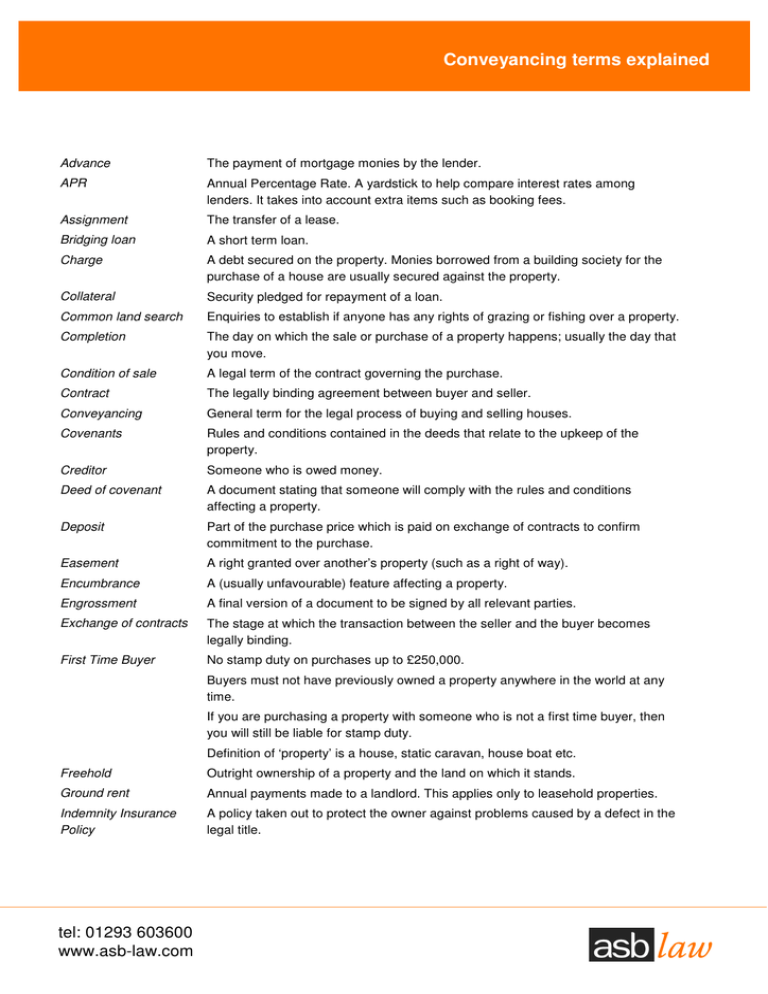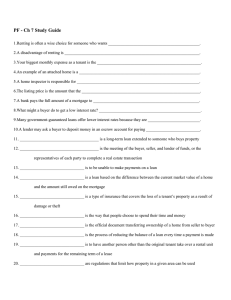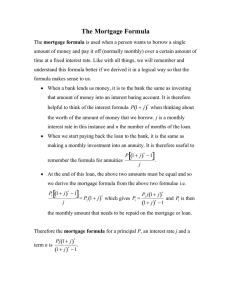Conveyancing terms explained
advertisement

Conveyancing terms explained Advance The payment of mortgage monies by the lender. APR Annual Percentage Rate. A yardstick to help compare interest rates among lenders. It takes into account extra items such as booking fees. Assignment The transfer of a lease. Bridging loan A short term loan. Charge A debt secured on the property. Monies borrowed from a building society for the purchase of a house are usually secured against the property. Collateral Security pledged for repayment of a loan. Common land search Enquiries to establish if anyone has any rights of grazing or fishing over a property. Completion The day on which the sale or purchase of a property happens; usually the day that you move. Condition of sale A legal term of the contract governing the purchase. Contract The legally binding agreement between buyer and seller. Conveyancing General term for the legal process of buying and selling houses. Covenants Rules and conditions contained in the deeds that relate to the upkeep of the property. Creditor Someone who is owed money. Deed of covenant A document stating that someone will comply with the rules and conditions affecting a property. Deposit Part of the purchase price which is paid on exchange of contracts to confirm commitment to the purchase. Easement A right granted over another’s property (such as a right of way). Encumbrance A (usually unfavourable) feature affecting a property. Engrossment A final version of a document to be signed by all relevant parties. Exchange of contracts The stage at which the transaction between the seller and the buyer becomes legally binding. First Time Buyer No stamp duty on purchases up to £250,000. Buyers must not have previously owned a property anywhere in the world at any time. If you are purchasing a property with someone who is not a first time buyer, then you will still be liable for stamp duty. Definition of ‘property’ is a house, static caravan, house boat etc. Freehold Outright ownership of a property and the land on which it stands. Ground rent Annual payments made to a landlord. This applies only to leasehold properties. Indemnity Insurance Policy A policy taken out to protect the owner against problems caused by a defect in the legal title. tel: 01293 603600 www.asb-law.com Intestate Dying without having made a will. Joint tenants When property is owned by two people as “joint tenants,” on the death of the first of those people, the property passes outright to the survivor. It matters not what is contained in the deceased’s will. Land registry A government department which maintains the national property register. Landlord One who owns property and rents it to others. Lease A document made between a landlord and a tenant, setting out the terms of occupation of a property. Leasehold The occupier owns the right to reside in a property for a fixed term but not the land on which it stands. Licence to assign The formal permission given by a landlord for a buyer to purchase the leasehold of a property. Local search Enquiries made of a local authority concerning planning and services. Management company A company formed to comply with a landlord’s obligations under a lease. Mortgage A loan secured against a property. In the event of non-payment, there is usually a right to sell the property. Mortgage indemnity policy An insurance policy taken out by a mortgagee to cover any loss in the event of a forced sale. Usually, the company providing the policy has the legal right to recover the loss from the borrower. Mortgagee A money lender, such as a building society or bank, who secures the loan against a property. Mortgagor The borrower who gives security to the lender. NHBC National House Builders Council. The NHBC provide a ten year guarantee for new properties. Office copy entries Official copies of the Title, obtained from the land registry, confirming ownership of the property. Personal representative The person appointed by a will to act for the deceased owner. Redemption Paying off a mortgage. Registered land Land which is registered has its ownership details recorded at the Land Registry. Repayment mortgage A mortgage where the borrower makes interest and capital payments to the lender. Requisition on title Queries raised about the ownership of the property and how that ownership will be transferred. Retention Monies held back from an advance pending completion of building work to the property. Service charge Money requested by a landlord for repairs and maintenance to a property. Stamp duty A tax charged to purchasers buying properties for more than £125,000, unless you are a First Time Buyer. Structural survey An assessment of the essential framework of a building. Subject to contract Negotiations which do not become binding until contracts are exchanged. tel: 01293 603600 www.asb-law.com Tenant A person who pays rent to another for the use of a property or land. Tenants in common Where two or more people own a property as ‘tenants in common’, and one of them dies, the deceased’s share of the property will pass according to what has been stated in the deceased’s will (or according to the rules of intestacy, in the even of no will having been made). Tenure The type of property: Freehold or leasehold. Term A period of time, such as the length of a mortgage. Title Current ownership of a property. Transfer The document which hands over the ownership of the property. Valuation Assessment of a property’s value. tel: 01293 603600 www.asb-law.com



